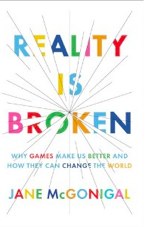Pax
Stacey Mason

HTLit was among the sold-out crowd of 60,000+ gamers at this weekend’s Pax East trade show in Boston. This was the event’s second year, and seemed much more organized and prepared. The venue was bigger, there were more panels, and the game industry seemed to be taking the expo much more seriously. The big companies were there in full force, and some of the lines to try new games had 9-hour wait times.

Jane McGonigal’s energetic opening keynote set the tone for a weekend filled with positive attitude. Though we were hoping for more mention of her Alternative Reality Game work, McGonigal did offer fascinating data on the impact of gaming on mood and optimism, dispelling long-standing myths of games as pernicious (ideas that she expands upon in her recent book, Reality is Broken: Why Games Make Us Better And How They Can Change the World). She demonstrated how she made her recovery from a head trauma into a game, and encouraged the audience to turn their daily activities into games. When it comes to gaming, work is often more fun than play.
The panel on dialogue was good. We were disappointed that a number of IF authors, especially Emily Short, were unable to attend, but Blue Lacuna creator Aaron Reed filled in and contributed some interesting thoughts . Dialogue is a particularly difficult skill to master in print, but all the more difficult when the it must have several plausible outcomes. The panel discussed the difficulty, how we might make this dialogue seem more natural and fluid, and the ideal that developers are striving for: an engine which would allow you to make a mistake while speaking to an NPC, have an NPC get the wrong impression, but allow you to correct it somewhat and receive more immediate feedback within a conversation.
A panel on female character representation disseminated a dollop of feminism to an industry known for sexist tropes and stereotypes. Despite a good number of women at the expo, the panel’s audience was predominantly male. The panel argued that women were not turned away by attractive characters or even by nudity, nor are they only looking for strong, perfect female protagonists. Women do dislike poorly developed female characters, and resent the tendency to make all of the females in a game inept or whiney. The panel analyzed several prominent female characters, discussing strengths and weaknesses in their characterizations. The panel also observed that most minorities suffer even worse representations than women.
